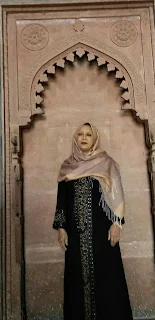In his Friday Sermon of 25 February 2022~ 23 Rajab 1443 AH, Imam- Jamaat Ul Sahih Al Islam International Hazrat Khalifatullah Munir Ahmad Azim (aba) of Mauritius eloquently explains the ethics of Hijab in Islam. Speaking against the backdrop of the ongoing controversy in India and elsewhere over unfair restrictions on the civic freedoms of Muslim girls and women to access education and employment in the name of their religious attire, Hazrat Khalifatullah (aba) offers an exposition on the Islamic approach for the protection of women's identity, dignity, privacy interests, and rights in the social order.

As Hazrat Khalifatullah (aba) alludes in the discourse, the present controversy over Hijab is indicative of a deeper crises in societies fuelled by internal political conflicts over unemployment and other issues, including the recognition, accommodation and integration of minority groups. Liberal States in the West and elsewhere swear by their commitment to democratic values and fundamental human rights- including freedom of conscience, freedom of religion and minority rights- and yet, the apparently neutral policies that they espouse betray direct or indirect discrimination- with disproportional impact upon the religious minorities living in the land; forcing the minority communities to choose between their commitment to religious beliefs and cultural practices and the dictates of national culture -raising searing questions of justice and equity in law and policy.
Consider the present, manufactured controversy over Hijab. The 'presence' of Muslims as a people manifesting their religious practices such as Hijab and going about their everyday lives apparently challenge pre-existing notions of 'secular' public sphere with their rules of engagement such as uniforms in academic institutions and dress code in employment, etc. Majoritarian intolerance and hatred against minority groups point to political mobilization. Illiberal forces weaponize secular law to erase the 'hated' symbols of minorities- such as the Hijab- from the public sphere. Indeed, beneath the veneer of liberal quibbling over the role of 'religious' symbol- Hijab- in 'secular' space, with no corresponding attention to the symbols of the majority that are all over the public sphere; Islamophobia- the prejudice and suspicion and hatred and intolerance against Islam as a religion and Muslims as a community- is 'the elephant in the room' that needs to be called out.
With ideologies of racial supremacism, ethnic nationalism, and religious majoritarianism increasingly gaining public support in several multicultural states, 'Islamophobia' is indeed regrettably widespread in our times. In the names of modernity and secular values of women's emancipation and empowerment, the Islamic headscarf and other veiling practices are viewed as 'oppressive' by the non-Muslim world. Hence, Muslim girls and women are left with no option but to resist and mount legal struggles to gain recognition and public acceptance for their Hijab. It is instructive to note in this context that without clear respect for the inherent dignity and rights of the human person and her free choices, including the recognition of 'difference' in the spirit of diversity; without an ethic of compassion for 'minority' groups who don't share the values of the majority; the claims of upholding liberalism, democracy, secularism and human rights are empty or hollow. As more and more women- [both Muslims and non-Muslims]- are recognizing the appeal and benefits of Islamic teachings and embracing the convenience of the Hijab, the societies that seek to ban Islamic values are destined to be profoundly transformed in their approach sooner than later- whether they like it not, Insha Allah, Aameen.
Read the Friday Sermon Below:







